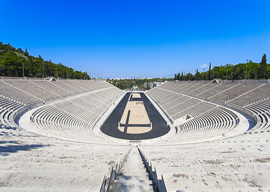
July 27, 2012

Panathenaic Stadium, Athens
Regarding karate, we have always wanted to take part in the Olympics but were never able to unite and were outsmarted by taekwondo. The Korean government appears to have bribed the IOC to allow this totally phony martial art to become an Olympian entry. Compared to karate, taekwondo is like playing American touch football or rugby without tackling. The contestants also wear protective equipment in case they hurt themselves, the poor dears. Every time one touches the opponent a score is counted. If this is a martial sport, I’m Monica Lewinsky’s mother. Taekwondo is now an Olympic staple, and it’s not uncommon for some nerdy guy who is quick on his feet to show off a gold medal. I only hope for his sake he doesn’t try it in some Liverpool dive.
Kendo has never become an Olympic sport, which is what saves this great and beautiful martial art. Kendo means the “way of the sword.” Courage, honor, and etiquette are imperative. The scoring is highly subjective, valuing form and execution as much as the result. An ippon, kendo’s equivalent of a knockout, is not judged electronically as in fencing, but is a judgment call. Two out of three referees need to agree. Kendokas have resisted the electronic result because technology in their eyes would degrade victory’s beauty.
See what I mean by purity? Judo has been compromised, as has karate, by the introduction of weight classes and by contestants scoring points as in boxing. In the good old days, a 60-kilo person like yours truly would have to fight a 100-kilo one like you would in the street. (Except in the latter I don’t know of anyone bowing before or after the fight.)
Kendo has resisted “winning at all costs” by keeping the scoring nebulous and subjective. Form and courage beat a winning thrust. How to be is more important than how to win. That’s what Baron de Coubertin meant about what’s important in the Olympics—taking part.
Next week I’ll give you all a break. No sports, just the Middle East.
Image courtesy of Shutterstock